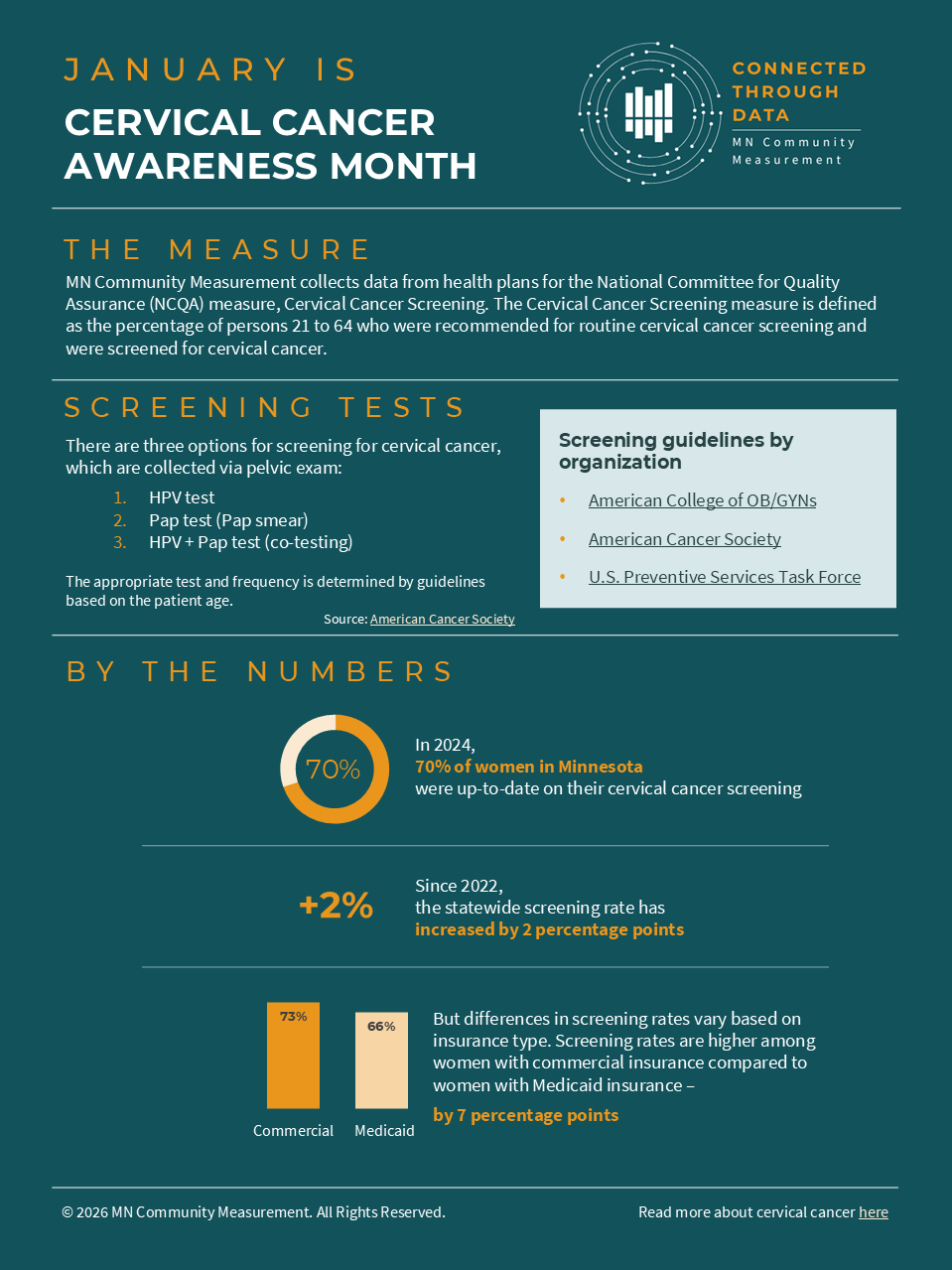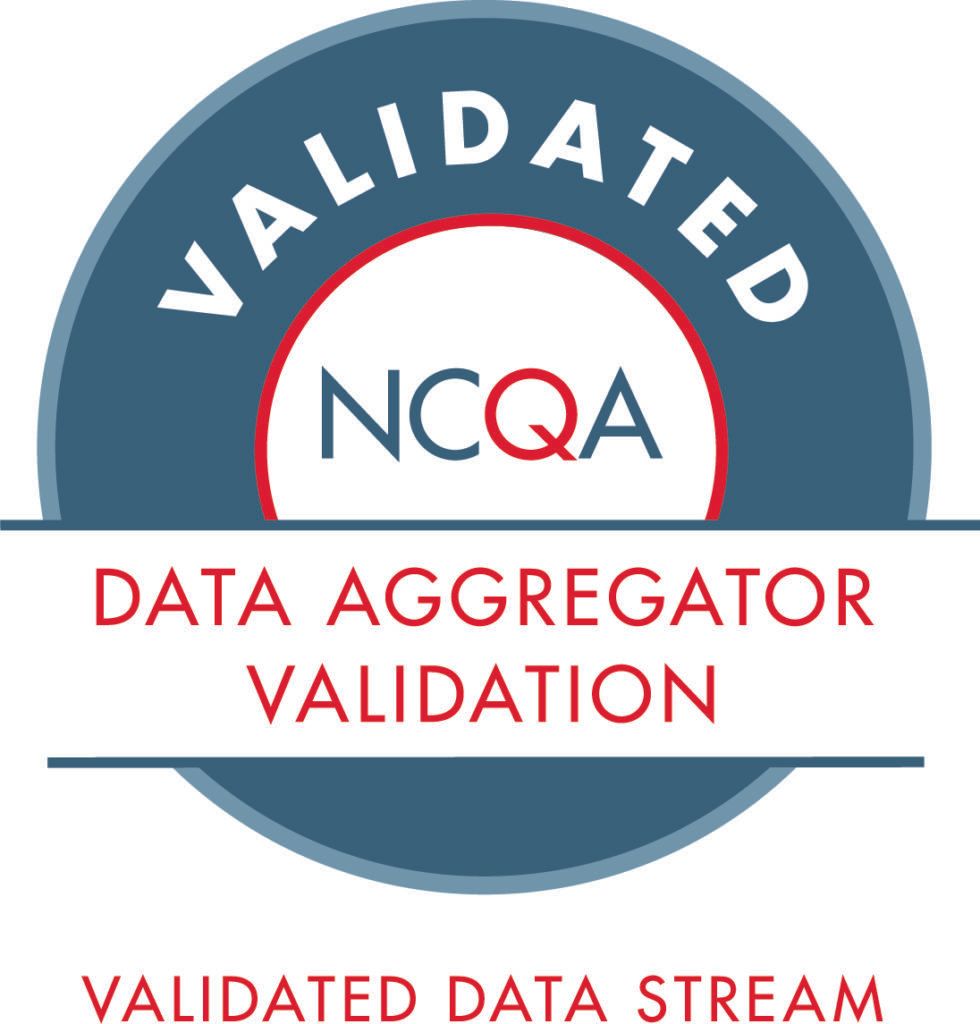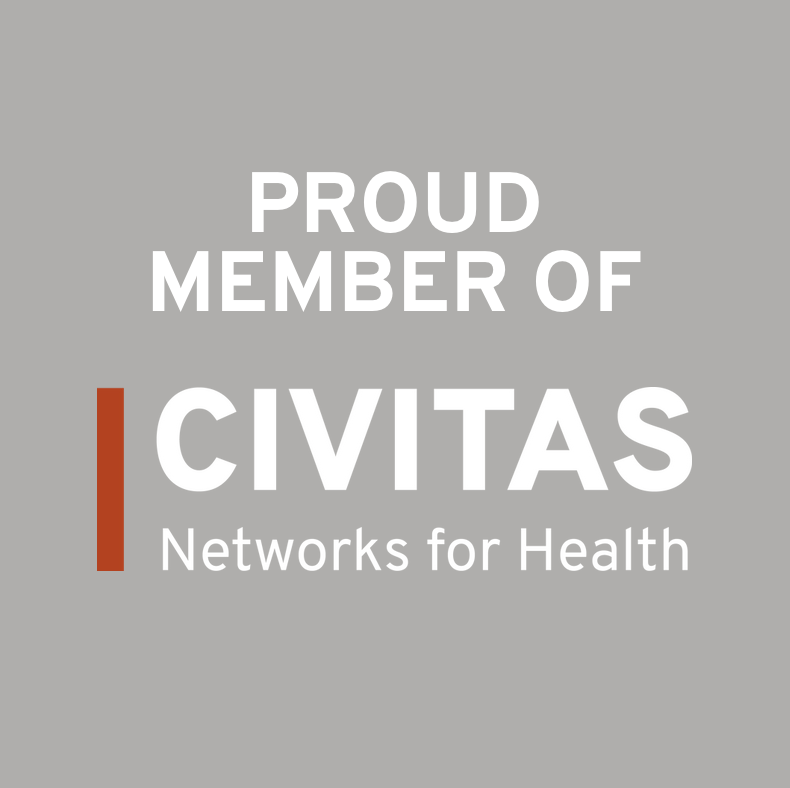Shaping Minnesota’s Health Data Future: Insights from MNCM President Liz Cinqueonce at the 2024 State of Reform Conference
September 9, 2024
On September 5, 2024, Liz Cinqueonce, President and CEO of MN Community Measurement (MNCM), participated in a dynamic panel discussion at the 2024 Minnesota State of Reform Health Policy Conference. The panel, titled “What’s Next for Improving Minnesota’s Health Data Landscape?”, explored key topics in health data, quality measurement, and policy, featuring insights from other prominent leaders including Jennifer Lundblad (Stratis Health), Chad Peterson (Koble Group), and Dr. Tyler Winkelman (Hennepin Healthcare Research Institute). Here are some of Liz Cinqueonce’s responses to the moderator’s questions during the session:
Introduction to MN Community Measurement
Liz began by introducing MN Community Measurement, a nonprofit community collaborative established in 2005. The organization’s board includes diverse perspectives, ranging from health care providers and health plans to state government, employers, consumers, and researchers. MNCM was founded on the belief that collaboration and transparency can drive improvements in health care.
MNCM’s mission is to empower health care decision-makers by providing meaningful data that drives improvement in quality, equity, and affordability. This includes:
- Convening stakeholders from various sectors to identify common priorities for health care improvement.
- Developing and validating measures focused on outcomes of care.
- Providing private and public reports on quality, equity, and cost, enabling a deeper understanding of the current landscape and areas for improvement.
- Collaborating with health plans and medical groups to share data that helps address gaps in care and improve patient outcomes.
The organization’s data is widely used by health plans, providers, and researchers to guide quality improvement initiatives, value-based payment models, and efforts to address health disparities.
The Future of Health Data in Clinical Care
In discussing health data within clinical care, Liz emphasized MNCM’s role in empowering care providers with meaningful, actionable data that can be easily integrated into workflows. She highlighted MNCM’s ongoing efforts to modernize data collection and reporting processes, as well as the introduction of the Common Health Information Reporting Partnership (CHIRP) program.
The CHIRP program aims to address data-related barriers to value-based care by creating standardized data flows between health care providers and payers. This bidirectional feedback loop ensures timely, accurate data exchange. As of March 2024, provider-to-payer data feeds were fully operational, with payer-to-provider feeds slated for rollout in mid-2025.
Liz highlighted that this approach creates efficiencies for both providers and payers by reducing the need for manual data collection, improving the accuracy of gap reports, and facilitating better care coordination. The program’s design also leverages existing data submitted to MNCM, minimizing additional effort while maximizing value.
The Horizon of Health Data in Quality Measurement
Quality measurement remains at the heart of MNCM’s work. Liz outlined three key focus areas for the organization’s future:
- Measure Prioritization : MNCM has identified maternal/child health, well-child visits, and opioid use as high-priority areas for future measures. The first of these, well-child visits, provides the best opportunity for near-term implementation and is set to move forward, pending funding to integrate it into MNCM’s data systems. MNCM will be continuing to explore opportunities to implement measures for maternal/child health and opioid use in the future.
- Asthma Measure Review : In response to concerns about the current asthma measures, MNCM is convening a workgroup to review and improve how asthma control is measured. Recruitment for this group will begin in late September and will be announced in the Measurement Minute newsletter.
- Social Risk Factors (SRF) : MNCM has began collecting SRF data in early 2024 to better understand how social determinants influence health outcomes. Liz noted that 59 organizations have already submitted SRF data, representing over a million patients, and MNCM is committed to expanding this effort to improve data completeness in the coming year.
Health Data in Research and Evaluation
Liz emphasized the importance of research partnerships in advancing MNCM’s mission. She outlined four foundational elements that MNCM brings to these partnerships: trust as a neutral convener, a robust legal framework, secure technical infrastructure, and rich historical data on clinical quality and costs.
Currently, MNCM is engaged in two major research initiatives:
- Minnesota EHR Consortium : MNCM helps small and mid-sized medical groups that are submitting data through its PIPE system to participate in public health and research initiatives through the EHR Consortium, ensuring their voices are included in valuable studies.
- MNCARES Project : MNCM partners with the HealthPartners Institute and the Minnesota Department of Health to evaluate the impact of including social workers in care coordination teams. Though the first stage of the MNCARES project has been completed, the organization is hopeful this work will continue, pending additional funding.
Balancing Minnesota-Specific and Federal Approaches
Liz highlighted that while it’s beneficial to leverage national standards and federal opportunities, Minnesota has a history of innovation. MNCM’s philosophy is to adopt national solutions when feasible, but the organization doesn’t wait for federal standards to catch up. Instead, it informs and influences those standards, drawing on local needs and experiences.
For example, MNCM’s early work on Social Risk Factors data collection serves as a model for national conversations. Liz acknowledged that sometimes state-level innovations can be “leapfrogged” by national standards, but taking the innovative approach means Minnesota remains at the forefront of improvements in quality, equity and affordability. To mitigate risks, MNCM closely monitors federal developments while continuing to prioritize what works for Minnesota.
Navigating Minnesota’s Unique Privacy and Consent Environment
Minnesota’s privacy and consent laws create a more complex environment for health data exchange, but Liz noted that it’s something MNCM is well-prepared to manage. Contracting with Minnesota health organizations requires diligent legal oversight to ensure compliance with both state and federal laws. While this can lengthen the process and increase costs, it also strengthens the legal framework.
MNCM’s software and data infrastructure are built to comply with Minnesota’s privacy requirements, and the organization conducts annual reviews to ensure ongoing compliance with changes in the law.
Conclusion
Liz Cinqueonce’s contributions to the 2024 Minnesota State of Reform Health Policy Conference provided valuable insight into MNCM’s ongoing efforts to improve health care quality, equity, and affordability in Minnesota. By focusing on collaboration, innovation, and transparency, MNCM continues to play a crucial role in advancing the state’s health data landscape.
Posted in Blog
Recent Posts







